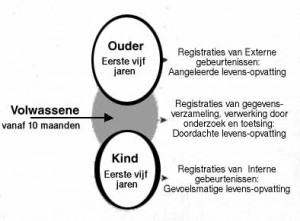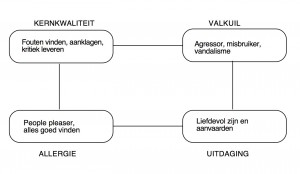WHAT WE ROLL PLAY T.O.V. OUR PARTNER?

Uit de Transactionele analyse(TA) kennen we de rollen Ouder, Adult and Child, the rollers in each other are as follows:
PARENT: If you behave like your parents / guardians did.
ADULT: If you behave, think and feel in a way that suits the realities of the present and the person you are NOW, in accordance with the possibilities you have NOW. (This has however nothing to do with an adult: a child 6 can also assume the adult role).
KIND: If you behave, thinks and feels like when you were a child.
We usually frequent change of role, but there are also people who mainly play a particular role and / or exclude another role.
If A is in the role of parent and is focused on the child in B, B can not react as adult to adult A, but must itself or as a child or as a parent preparing to meet and to create report.
FIXING AND subversive SIDE OF THE ROLES:
PARENT: FEEDING: worry, be- & encourage, watch out for the other. CRITICAL: prohibit, patronize, areas, check, overstelpen, slash, ignore, smaller, beleren. LIMITS: overschrijd de grenzen van anderen nogal eens
ADULT: POSITIVE: Record information, accept the situation, think logically, plan, realistic in the now, empatisch, loving. NEGATIVE: calculate, uninvolved, detached, void. LIMITS: healthy boundaries that can open and close as needed, flexible en dynamic
KIND: FREE: impulsive, spontaneous, creative, lerende capaciteit. NEGATIVE: claiming, egocentric, childish. OBEY of REBELS: docile / adjusted or oppositional (= As adjusted!).. LIMITS: has its limits not
THE DRAMA TRIANGLE: MAKES & MANIPULATION.
(reactions from the rolls PARENT & KIND. The adult role does not participate here).
PROSECUTOR:
Sees the other as inferior and not okay.
Kleineert de other.
Is accusatory
Reproaches.
Is evil without positive desire for change.
Violating the limits of the other
The prosecution says & thinks & feels example:
“Now I've got you…”
“You're doing it all wrong.
“If you / the world was different…”
“I have warned you….”
“If you do not do what I say….”
“To you I have nothing…”
“You're a bad partner / husband / father….”
“I want to get my gram…”
“You have done me vanalles”
REDDER:
Sees the other as inferior and not okay.
Responds by offering help from a superior position.
Sees the other as helpless.
Gives himself the right / duty to help (even without the other person helps itself).
Provides assistance that keeps dependent / make.
Overestimated themselves and underestimated the other.
Violating the limits of the other
The Saviour says & thinks & feels example:
“I'm trying to just help”
“Why do not you…”
“What you need to without me…”
“It is in your own interest”
“Let me do it”
VICTIM:
Sees himself as inferior and not okay.
Complains without taking responsibility.
Keeps / makes them unnecessarily dependent.
Underestimate themselves and overestimated others.
Let violating its limits
Victim says & thinks & feels example:
“I do not know / can it not / do not get it….”
“It is so hard…”
“Poor me…”
“Yes but….”
“Shovel & lettuce & but insults, I deserve it…”
“You know how it all better than I”
“You're always so me on my neck”
“You always nag”
“I can never do it right”
“It's all up to me”
Casualties
You feel you are a victim of everything around you. You often speak in terms of 'yes, but', "I happen to be so ',"I am the way it is busy ', "I can do nothing to do ' , ‘het komt door de kredietcrisis/de overheid/de ander’,etc. In short: Victims like to complain and often feel less than others. They also often feel resentful because their adaptive behavior does not produce the result they would like to see, they are self-effacing in hopes be rewarded and that does not work and this leads to resentment and anger
Prosecutors
You fall another happy verbally with words and phrases like; 'You're so forgetful ", 'To you I have nothing', "I annoy me a lot of you ', "You can not even stop that whining" etc. Prosecutors drop others, always know better and often place themselves above others. The prosecutor says the other person what he or she should think, feeling and doing and wants to control the other.
Rescuers / helpers
You help others too numerous and too happy and you take your responsibilities that do not belong to you. You solve problems too happy to colleagues, find it hard to delegate and loves to harmony. Rescuers do not go like conflicts. Rescuers do not understand that if they never learn the other person to take responsibility for their lives, they are taking over the other and it is quite presumptuous and patronizing and arrogant and there lies so inferiority among, the shadow side of the Enneagram type helper is the feeling I'm not worth anything. They think they can derive their value from their helping behavior and try to take it so outside, where it is not to be found.
The trick is to get the subtlety to go see the roles in your work / life. This is only when you look very honestly at yourself and see that every day many times is in the drama triangle.
Here, too, is changed from time to time of roll.
For example:
Victim has at some point had enough of the Saviour or the Prosecutor. Then he / she can stand up and assume the role of prosecutor. The Saviour or prosecutor then takes often the role of victim to: “I'm trying to just help.” (formerly the Savior) of “What have I done so wrong?!” (formerly the Prosecutor).
STEPS HOW WE OUT HERE?
Tips for PROSECUTOR:
Provide and / or ask for feedback and do want to influence a step back rather than the lives of others, command & check. Respect the limits of the other.
Tips for the SAVIOUR:
Help to tune the other by help the others and take responsibility for yourself instead. only for the other. And see that the other self must take its responsibilities and provide assistance only when prompted, and thus violating the borders of other non.
Tips for VICTIM:
Be realistic and responsible for your own life instead. merely pointing to the other. Pay more attention to your limits, Be assertive and respect your limits.
Bron: Espavo – Sylvia Slegers, met heel wat aanvullingen van mij. Dit artikel zal worden opgenomen in de brochure ‘Persoonlijke grenzen en codependentie’ dat in 2012 will appear



